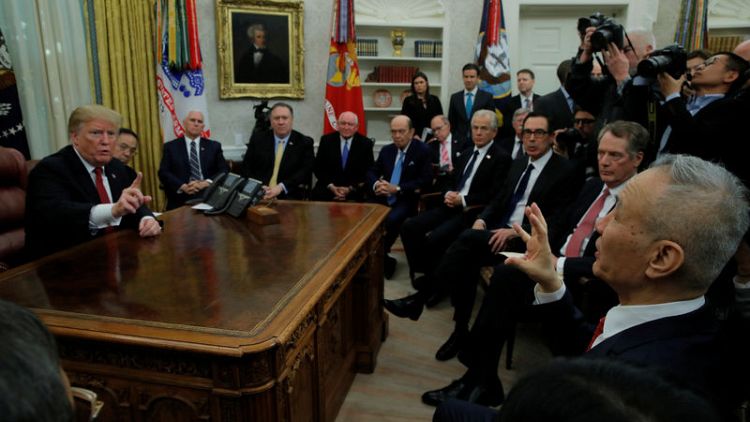By Jeff Mason and David Lawder
WASHINGTON (Reuters) - President Donald Trump said on Thursday he will meet with Chinese President Xi Jinping soon to try to seal a comprehensive trade deal as the top U.S. trade negotiator reported "substantial progress" in two days of high-level talks.
Trump, speaking at the White House during a meeting with Chinese Vice Premier Liu He, said he was optimistic that the world's two largest economies could reach "the biggest deal ever made." No specific plans for a meeting with Xi were announced, but U.S. Trade Representative Robert Lighthizer and Treasury Secretary Steven Mnuchin will lead a U.S. negotiating team going to Beijing in early February.
U.S. and Chinese delegations held the second of two scheduled days of talks in the U.S. capital.
"I think that we have made tremendous progress. That doesn't mean you're going to have a deal," Trump added, citing "a tremendous relationship and warm feeling."
Lighthizer said there was much work to do to reach an agreement, but cited "substantial progress" in talks that focused on issues such as protecting American intellectual property, forced technology transfers, agriculture and "enforcement, enforcement, enforcement."
"At this point, it's impossible for me to predict success. But we're in a place that if things work out, it could happen," Lighthizer added.
Trump said he did not think he would need to extend a March 1 deadline for raising U.S. tariffs on Chinese goods if no deal is made.
"I think when president Xi and I meet, every point will be agreed to," Trump added.
Trump has threatened to raise tariffs on $200 billion (£153 billion) of Chinese goods to 25 percent from 10 percent on March 2 if an agreement is not reached and impose new tariffs on the rest of Chinese goods shipped to the United States.
"This isn't going to be a small deal with China. This is either going to be a very big deal, or it's going to be a deal that we'll just postpone for a little while," Trump, who has engaged in a series of fights with a variety of trade partners since becoming president in 2017, said earlier at the White House.
"I'd like to accommodate China if we can get the deal done," Trump said.
'THAT'S PROBLEMATIC'
An official with the U.S. Chamber of Commerce business group said after being briefed on the talks that significant differences remained between the two sides, with no new Chinese proposals to address core U.S. demands that Beijing end forced transfers of U.S. technology to Chinese firms, heavy state industrial subsidies and discriminatory digital trade laws.
"Our sense from our discussions last week in China is that China is struggling to come up with anything on the technology transfer side, and from our standpoint that's problematic," Myron Brilliant, the chamber's head of international affairs, said.
Brilliant added that there was some progress in narrowing differences over enforcement of intellectual property rights such as copyright and piracy criminalisation issues.
Trump was scheduled to meet with the leader of the Chinese delegation, Vice Premier Liu He, at the White House later in the day as talks conclude. Two White House officials said it was likely Liu would extend an offer for Trump to meet with Xi in China.
Trump has vetoed multiple proposed trade deals with China, choosing to push ahead with tariffs on Chinese goods to gain leverage. Trump said on Twitter he was looking for China to open its markets "not only to Financial Services, which they are now doing, but also to our Manufacturing, Farmers and other U.S. businesses and industries. Without this a deal would be unacceptable!"
People's Bank of China Governor Yi Gang declined comment on Chinese proposals as he left the delegation's hotel for the meetings in Eisenhower Executive Office Building, next to the White House. Asked how the talks were going, Yi flashed a thumbs-up sign.
U.S. officials have demanded that Beijing make deep structural changes to its industrial policies, including broad new protections for American intellectual property and an end to practices that Washington has said force U.S. companies to transfer technology to Chinese firms in exchange for market access.
The U.S. complaints, along with accusations of Chinese cyber theft of American trade secrets and a systematic campaign to acquire U.S. technology firms, were used by Trump's administration to justify punitive tariffs on $250 billion worth of Chinese imports.
China has retaliated with tariffs of its own, but has suspended some and is allowing some purchases of U.S. soybeans during the talks.
Chinese officials have said their policies do not coerce technology transfers.
The U.S. tariffs on Chinese goods are just one front in Trump's efforts to upend the global trading order with his "America First" strategy. He has also imposed global tariffs on imported steel and aluminium, washing machines and solar panels and has threatened to raise tariffs on imported cars unless Japan and the European Union offer trade concessions.
(Reporting by Doina Chiacu, Susan Heavey, Chris Prentice, Jeff Mason, Steve Holland, Alexandra Alper and David Lawder; Writing by David Lawder; Editing by Will Dunham)



